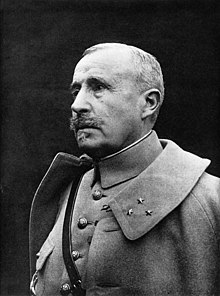General Nivelle
| Robert Nivelle | |
|---|---|

General Nivelle, wearing the three stars of a General de Division
|
|
| Born |
15 October 1856 Tulle, France |
| Died | 22 March 1924 (aged 67) Paris, France |
| Allegiance |
|
| Service/ |
French Army |
| Years of service | 1878–1921 |
| Rank | General de division |
| Commands held |
|
| Battles/wars |
|
| Awards | |
Robert Georges Nivelle (15 October 1856 – 22 March 1924) was a French artillery officer who served in the Boxer Rebellion, and the First World War. Nivelle was a very capable commander and organizer of field artillery at the regimental and divisional levels. In May 1916, he succeeded Philippe Pétain as commander of the French Second Army in the Battle of Verdun, leading counter-offensives that rolled back the German forces in late 1916. During these actions he and General Charles Mangin were already accused of wasting French lives.
Following the successes at Verdun, Nivelle was promoted to commander-in-chief of the French armies on the Western Front in December 1916, largely because of his persuasiveness with French and British political leaders, aided by his fluency in English. He was responsible for the Nivelle Offensive at the Chemin des Dames, which had aroused skepticism already in its planning stages. When the costly offensive failed to achieve a breakthrough on the Western Front, a major mutiny occurred, affecting roughly half the French Army, which conducted no further major offensive action for several months. Nivelle was replaced as commander-in-chief by Philippe Pétain in May 1917.
Robert Georges Nivelle, born on 15 October 1856 in the French provincial town of Tulle in Corrèze, had a French father and an English Protestant mother. Nivelle also was a Protestant and this was a help to him as in the context of the politics of the French military Catholic piety was a handicap. He began his service in the French Army in 1878 upon graduating from the École Polytechnique. Starting as a sub-lieutenant with French artillery, Nivelle became a colonel-of-artillery in December 1913. During that period, Nivelle served with distinction in Algeria, Tunisia and in China during the Boxer Rebellion (1898–1901).
...
Wikipedia
